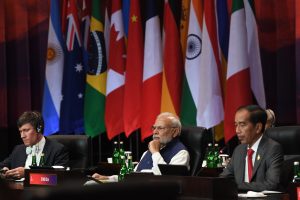The war in Ukraine exposed the fragility of peace but also of food and energy security. For the West, the fragility of European security took center stage, while for the developing world, the uncertainty of food and energy access garnered urgent attention. This year’s G-20 summit in September in New Delhi is poised to reflect a lot of the global division and differences in priorities between the West and developing countries.
Western nations, such as the United States, are likely to emphasize the Russia-Ukraine war more than other issues. Meanwhile, India’s focus is likely to include other long-term issues that disproportionately impact developing nations, a commitment Prime Minister Narendra Modi affirmed in his speech to the G-20 ministerial gathering. Growing geopolitical impasses could stall meaningful multilateral action from the upcoming summit.
As such, how should India go about achieving its G-20 agenda and what kind of accomplishments can we expect to see?
Overall, the G-20 summit could provide the ideal platform for India to set the tone for its emerging global leadership and communicate what responsibilities it wants to bear under that leadership. While obtaining the G-20 presidency alone is not necessarily a demonstration of influence, the kinds of issues India chooses to engage in will determine the country’s ability to show effective leadership at the G-20.
Modi’s announcement of the G-20 theme, “One Earth, One Family, One Future,” is an indication of India’s attempt to unite the G-20. Of this ambitious agenda, digitalization and food security are two focus areas that India should not only prioritize but are areas where India will be able to showcase its own progress.
As Western countries undergo a massive digital transformation, developing countries risk being left behind. The Modi government understands the urgency of digitalization and can encourage other developing countries to be self-sufficient and ambitious toward their goals for digital transformation as well as food security. India can highlight its advances, such as the National Digital ID program and India Millet Initiative and offer developing countries a success story to encourage them to adopt similar practices. As the world’s most populous country, India’s biometric unique identification system is a particularly powerful demonstration of how developing nations can take advantage of digitalization to drive social innovation. Additionally, India can use the international momentum gained after the U.N. announced 2023 as “the year of millets” to encourage the use of millets as a common solution for food security, especially in the developing world.
Leading the G-20 this year means holding the attention of countries that account for 85 percent of global GDP, 75 percent of international trade, and two-thirds of the world population. While last year’s G-20 summit in Bali addressed a host of issues important to the developing world, the Ukraine war dominated discussions. To drive the G-20’s attention to problems disproportionately impacting the developing world, Modi will have to emphasize, particularly to Western countries, that these issues will no longer be sidelined on the global stage.
This year, Russia and China will try to steer the conversation away from the Ukraine war, as evidenced by their rejection of portions of a closing statement criticizing Russian aggression in Ukraine at the G-20 Finance meeting. While there may not be consensus on Ukraine, the G-20 can still produce significant outcomes regarding digitalization and food security, two global and vital issues.
India will have to show that its newfound role as the Global South’s voice can coexist with its growing alliance with the West. A belligerent China has aligned India and the United States on more fronts than before. India is forging strong relationships, such as the Quadrilateral Security Dialogue, the Quad, with military and economic powers that will invariably have different priorities than developing countries. India now has a chance to build upon the momentum generated at last year’s G-20 summit to push not only for the Global South’s leadership, but also a rebalancing of priorities among G-20 members.
India’s G-20 presidency, however, will not be without challenges. While India’s unique relationship with both the United States and Russia seems like a strength to leverage for better outcomes, the reality is that these divides run deeper than India alone can bridge. In this increasingly fractured world where countries to the West and East engage in strategic competition, India’s hope to drive inclusivity at the G-20 will not be easy. It will also have to show strong credibility for its ability to lead on the issues most significant to the developing world. This G-20 will be an important testbed for whether India’s growing economic power will also afford it a strong influence at the global level.
Ultimately, India’s role as the voice of the Global South will need to be strategically balanced with the country’s growing ties with the West to build a strong foundation for consensus at the G-20. Shaping the multilateral agenda amidst varied national interests will be an important diplomatic test for India. Overcoming these challenges will be the true attestation of India’s potential as a future global leader.

































